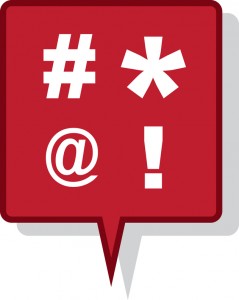How to handle swearing in your freakin' content writing
Writing content can be a real struggle when you’re not used to it. For some, it’s because they feel professional writing should look a certain way: proper English with lots of smart-sounding, 50-cent words.
One of the things content marketers will tell you is that you should write the way you talk. But what if the way you talk would make a sailor blush?
Is it okay to swear in your copy? (Tweet this quote)
Mofo: The line in the sand
Joanna Wiebe, copywriter extraordinaire, was recently taken to task in the comment section of an article she wrote for Copyblogger — not for what she wrote in her article, but for her bio, which contains the word “mofo.”
Reprimanded over the word mofo? Seriously? Seriously.
Another well-known copywriter was offended by this word, and let her (and everyone who subsequently defended her use of the word) know that it was unprofessional, rude, and downright stupid to use such salty language.
His point was, why take the risk of offending that 1 person in 100?
Other commenters were quick to answer: Because what if you lose that 1 person, but gain 5 others who find you and your dirty mouth cool?
Back to the damn future
Once, when I was a kid, my younger brother and I were watching “Back to the Future” at my grandmother’s. Grammy was doing chores around the house, but she came into the living room just in time to hear this exchange between Marty and 1955-era George McFly:
George: You really think I oughtta swear?
Marty: Yes, definitely. Goddammit, George, swear.
Grammy wasn’t wearing pearls, but had she been, I’m sure they would have been clutched in horror as she let out a dismayed, “Oh dear.”
Swearing is caring
My grandmother might have been unhappy with Marty’s word choice, but at the age of 11, I thought this was the most clever use of bad language I’d ever heard. I felt so cool knowing I got the joke, and to be honest, at 37 years old, I still feel cool about it.
One of the great things about swearing, when it’s used in a clever or comedic way, is that it can make people feel like they’re in on the joke. What exactly is the joke? That you don’t take yourself, or life, so seriously.
On her own site, CopyHackers, Joanna Wiebe wrote a response to the reaction caused by her Copyblogger post. She links to a bunch of studies that show why some of us react positively to salty language, and writes:
"studies aligning swearing and laughter – both of which are involved in shaping or not shaping relationships – have found this: swearing can promote group solidarity, strengthen group bonds and exclude non-members / better include members. Swearing, like laughter, causes a reaction in people. People like to react; we like to feel."
In other words, swearing is something that unites us. Most of us do it, even though we know we’re not supposed to do it.
To swear or not to swear
So what does this mean for you and your content? Should you diligently drop F-bombs into everything you write?
Well, maybe not. But that doesn’t mean you can’t.
Bottom line is this: you need to know who your audience is, and whether swearing is something that will endear you to them, or turn them away. If you do business with churches and other faith-based organizations, probably best to keep it clean. If you do business with start-ups owned by 25-year-olds, you’re probably safe referring to Google Analytic’s new dashboard as horseshit.
It’s important to let your personality shine through in your writing, and if swearing is in your nature, and it’s appropriate for your clients/customers/audience, then go ahead and let that freak flag fly.





